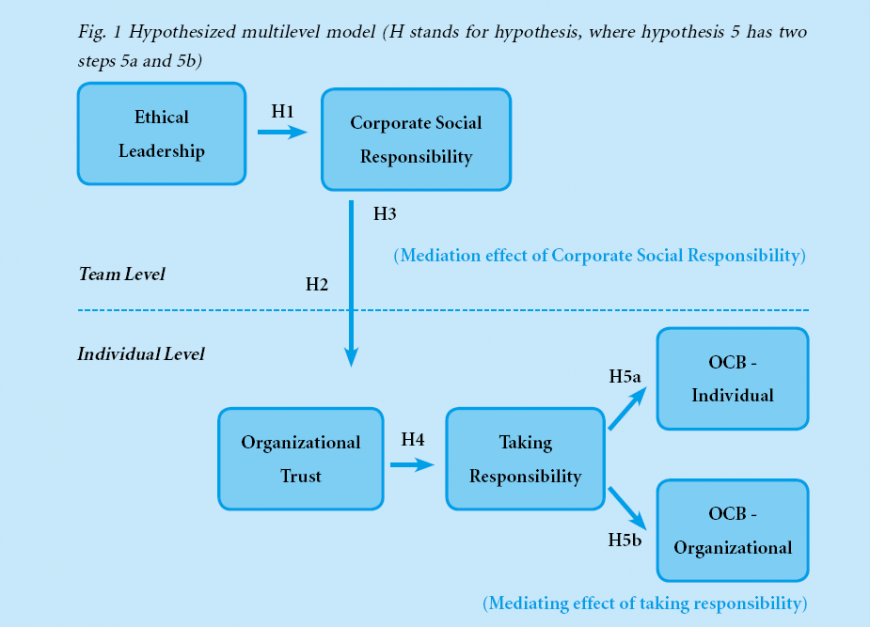The Importance of Ethical Leadership

By Louise Tourigny, Jian Han, Vishwanath V. Baba & Polly Pan
This article explains the long chain of intermediary factors between ethical leadership at the corporate level, and organisational citizenship behaviour (OCB) at the individual level. The starting point of the long chain is the high moral ground and social responsibility of ethical leaders. Along the chain, the most prominent variables are "trust" and "shared perceptions" of employees. The outcome variable of the long chain is employee OCB, in particular how they behave in terms of taking responsibility at work. The researchers approached this study from the perspectives of corporate social responsibility (CSR) and trust, and their conclusions could prove very useful for managers of fast-growing Chinese companies that face fierce competition.
Research background & theoretical framework
Undoubtedly, remarkable professional capability is essential to senior corporate executives. However, more and more cases show that the ethical stance of senior executives, especially their CSR leadership, has far-reaching impact on the company's development. We used data from a large manufacturing company located in southwest mainland China and did empirical research from a CSR perspective. We found that ethical leaders who have a positive effect on CSR are more likely to promote the following positive outcomes within the company:
- Ethical leadership creates awareness of CSR among employees and shapes their perceptions of CSR, which in effect motivates them to act more responsibly in their personal lives.
- Enhanced individual trust in the organisation motivates employees to believe that their company cares about their welfare, their community and the society at large.
- Perceived ethical leadership inspires employees to act more responsibly and take on additional responsibilities and engage in OCBs – to help develop new people, proactively minimise corporate costs, take on ownership, etc, which are all relevant to improving the overall performance of the organisation.

The main theoretical framework of this paper is rooted in social exchange theory and the principle of reciprocity between organisation and employees. "Trust" is the most crucial element in the empirical chain of this study. We found that when leaders are actively engaged in CSR in their management practices – such as environmental protection, public welfare, employee benefits, etc – it will help enhance employees’ shared perceptions that they can trust their leaders and their company. Leaders who are consistently cultivating CSR and building trust will elicit employees’ positive behavioural change and thereby improve organisational climate and corporate performance. The following are the specifics of the findings:
- Shared perceptions & active imitation
A socially-responsible ethical leader can elicit increased CSR in the company and its employees. Subordinates observe the behaviour of their leaders, especially those of their direct line managers, and form perceptions and a concrete understanding of CSR based on the signals they receive from those behaviours. In addition, from related research we further found that subordinates tend to mimic the behaviour of their supervisors. By setting a personal example, leaders model the values of the organisation as their moral development renders them sensitive to CSR policies. A sense of duty and justice among leaders results in CSR behaviour which in turn strengthens employee–organisation linkages, thus entrenching value alignment.
- Ethical leaders shape organisational trust among employees through CSR practices
When corporate leaders engage in CSR initiatives, they can touch upon employees' basic questions about "trust" via unexpected clues embedded in these practices: Whose interest does the company represent? What is the long-term objective of the company's existence and development? Can the company treat me and my colleagues fairly? At the individual level, when employees perceive the organisation as ethical, socially responsible and benevolent, they are more likely to trust the vision and mission of their company, and trust that the organisation will treat them fairly. As a result, they will become more open to organisational changes and procedures to the extent that they would be willing to sacrifice their own interest for the greater good of the company. Therefore, ethical leaders can gradually increase employees’ trust in the company through consistently practicing social responsibility.
- Organisational trust has a direct, positive impact on employees’ OCB and responsibility-taking behaviour
Once employees embrace the company’s overall goals and values, they will have more intrinsic motivations to demonstrate helping behaviour and responsibility-taking behaviour. Academics often call this “organisational citizenship behaviour (OCB)”, specifically referring to discretionary extra-role behaviour that can promote the overall welfare of the organisation. OCBs are directed toward one’s co-workers and other individuals who could be their supervisors or subordinates, or even someone in the organisation with no direct working relationship. Research shows that if employees recognise the company's overall development goals, or believe that their organisation is cognisant of their welfare and supportive of their efforts, they are more likely to pursue active interpersonal engagement with co-workers, such as taking initiatives to help new people develop and improve collegial collaborations. Employees will also demonstrate behaviour that is in the best interest of the organisation, such as proactively saving costs for the company and protecting the company’s public image. On the contrary, once trust is lowered between the organisation and employees, the latter may only seek to meet the minimum requirements of the job and do not want to take any extra responsibility so as to reduce the possibility of being criticised or avoid taking extra-role risks. From this perspective, employees' trust in organisations and leaders is a prerequisite for them to take the initiative. Therefore, we conclude that employees’ trust towards their organisation and their leaders lays the foundations for the emergence of helping behaviour in organisations.
The journey from ethical leadership to the perception and trust of employees which then lead to employees’ behaviour, is a multi-level path analysis at both the team level and at the individual level. There are six hypotheses for the above three points, as shown in Figure 1 below:

Research methods, sample & analysis strategies
To verify the hypothesis above, this study selected five businesses of a large manufacturing company located in southwest mainland China. The researchers contacted 150 work units from these. In each unit, we obtained data from various business functions such as research and development, quality assurance, production and operation, administration, customer service, and sales and marketing. Under the support of the director of human resources, we invited one employee per unit to serve as survey coordinator and to collect data. The survey coordinators explained the objectives of the study to participants and distributed questionnaires to supervisors and subordinates.
Of the 150 work units contacted, 71 agreed to participate in the study. This yielded a total of 71 supervisors and 310 subordinates. After removing unusable data, we had a total of 308 subordinates. The average number of subordinates in each work unit was four. The smallest work unit was composed of three subordinates and the largest had 14. The sample of subordinates was composed of 68% males. The average age was 33. In terms of education, 7% had completed high school, 31% had completed technical college, 35% had an Associate degree, 24% had a Bachelor’s degree, and 3% had a Master’s or Doctoral degree. For 71% of them, they had more than 3 years of organisational tenure. Among supervisors, 87% were male and averaged 38 years old. The level of education was overall higher with 24% completing technical college, 28% with an Associate degree, 41% with a Bachelor’s degree, and 7% with a Master’s or Doctoral degree.
The average length of the supervisor–subordinate relationship was 8 years. Subordinates provided ratings on the ethical leadership behaviour of their respective supervisors, perceptions of CSR, and extent of organisational trust. Supervisors were asked to rate the responsibility-taking behaviour and organisational citizenship behaviour (OCB) of each subordinate. A 7-point Likert scale ranging from 1 (strongly disagree) to 7 (strongly agree) was used for all items pertaining to study variables.
This study used a multi-layered path analysis method to test the hypothetical models and all the path coefficients were evaluated simultaneously. The results show that the model fit is satisfactory and the six hypotheses presented are all supported. Supervisory ethical leadership is positively related to the perceptions of CSR at the work unit level, therefore Hypothesis 1 is supported. Hypothesis 2 stated that there will be a cross-level direct path between perceptions of CSR at the work unit level and organisational trust at the individual level. Results show a significant cross-level path, thus Hypothesis 2 is supported. We further used shared perceptions of CSR as the cross-level mediation, and found the indirect relation between ethical leadership and individual organisational trust via shared perceptions of CSR remains positive. Therefore, Hypothesis 3 is supported. Hypothesis 4 proposed a direct effect of individual organisational trust on responsibility-taking behaviour. Results show that organisational trust is positively related to responsibility-taking behaviour. Thus, Hypothesis 4 is supported. Furthermore, the tests show that responsibility-taking behaviour has a positive effect on co-workers, other individuals and the organisation as a whole, respectively. The indirect effect of organisational trust on co-workers, OCB-I (individual) and OCB-O (organisation) are significant, thus providing evidence for the mediating effect of responsibility-taking, thereby supporting Hypotheses 4, 5, and 6.
Significance of this study
Through field research in real companies, this study elucidates a long chain process between leadership traits and employee behaviour. Findings reveal that supervisors’ moral qualities, such as integrity and fairness, affect their subordinates’ trust in the company. Meanwhile, if employees share a perception that the company actively practices CSR, they are more likely to trust the company. Therefore, supervisors demonstrating CSR behaviour through leading will enhance employees' trust in the company. Our findings also show that when the organisation and its leader consistently invest in CSR, this signals to employees that it is worth exerting extra effort. On the other hand, when employees recognise responsible leadership in their supervisors and the company, they are more likely to believe that they will receive fair treatment, and will be more willing to take extra-role responsibility and risks, resulting in the overall improvement of the organisation’s performance – hence a closed reciprocal loop is formed between individuals and organisations. In addition, in a collectivist culture like that of China, it is expected that the norm of reciprocity is stronger in its facilitation of social exchange. Consequently, individual-level displays of trust in the organisation set the stage for a fruitful social exchange between the organisation and its employees.
Louise Tourigny is Associate Professor of Management at University of Wisconsin – Whitewater; Han Jian is Associate Professor of Management at China Europe International Business School (CEIBS); Vishwanath V. Baba is based at McMaster University, Canada; Polly Pan works for CEIBS. This article was adapted from a paper published in the November 2017 issue of the Journal of Business Ethics: Ethical Leadership and Corporate Social Responsibility in China: A Multilevel Study of Their Effects on Trust and Organizational Citizenship Behavior.











